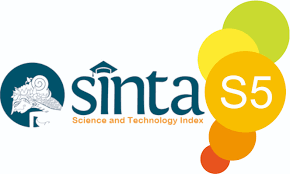Penerapan Gamifikasi Dalam Smart Tourism : Studi Literatur
 Abstract views: 779
,
Abstract views: 779
,
 PDF downloads: 934
PDF downloads: 934
Abstract
Tourism emphasizes the authenticity of an area with the principle of preservation and sustainable development, but technology is one factor that influences it enough to attract tourists or ease management in the tourism sector. The terminology of smart tourism appears as a direction in the support system for supporters in the tourism sector. One system in implementing smart tourism is gamification, which is still a lot of ordinary people in the system. This article examines the extent of the application of gamification in the concept of smart tourism and what things are still obstacles in the application of gamification in the tourism industry so that it can be a recommendation for further research. So that both are expected to provide an understanding of the application of gamification and the extent of realization in the concept of smart tourism. The method used in this research is a literature study. The results got by the application of gamification in smart tourism are very helpful in the tourism industry. This system provides tourism development, namely providing education, using the potential and use of technology. Gamification is a system where tourists are given more flexibility for activities and interacting with tourist areas, both visually and directly.
Downloads
References
Bahtiar, A. R., Segara, A. J. T., & Suyoto. (2020). Design of smart gamification in village tourism: An Indonesian case study. International Journal of Engineering Pedagogy, 10(1), 82–93. https://doi.org/10.3991/ijep.v10i1.11522
Borrero, F., Sanjuán Muñoz, P. C., & Ramírez González, G. (2015). Técnicas de gamificación en el turismo, prueba de aplicación, Casa Museo Mosquera. Sistemas y Telemática, 13(33), 63–76. https://doi.org/10.18046/syt.v13i33.2081
Femenia-Serra, F., Neuhofer, B., & Ivars-Baidal, J. A. (2019). Towards a conceptualisation of smart tourists and their role within the smart destination scenario. Service Industries Journal, 39(2), 109–133. https://doi.org/10.1080/02642069.2018.1508458
Melfianora. (2017). Penulisan Karya Tulis Ilmiah Dengan Studi Literatur. Studi Litelatur, 1–3.
Pinasthika, N., & Pradoto, W. (2018). Potensi dan Tantangan Pengembangan Kawasan Kota Lama Semarang sebagai Destinasi Wisata dengan Pendekatan Smart Tourism. Teknik PWK (Perencanaan Wilayah Dan Kota), 7(3), 153–164. http://ejournal3.undip.ac.id/index.php/pwk
Pitanatri, P. D. S. (2020). Wisatawan Flashpacker: Sebuah Pendekatan Epistemologis. Jurnal Master Pariwisata (JUMPA). https://doi.org/10.24843/jumpa.2020.v07.i01.p04
Putra, R. R., Siti Khadijah, U. L., & Rakhman, C. U. (2020). Pemanfaatan Teknologi Informasi dan Komunikasi dalam Penerapan Konsep Smart Tourism di Kabupaten Pangandaran. Jurnal Master Pariwisata (JUMPA), 7, 257. https://doi.org/10.24843/jumpa.2020.v07.i01.p12
Redjeki, S., Faizal, E., Iskandar, E., Rosadi, D., & Mustofa, K. (2018). Model Sistem Wisata Integratif : Sebuah Pendekatan Smart Tourism di Kabupaten Bantul. Seminar Nasional Teknologi Informasi Dan Komunikasi (Semnastik 2018), 16–25. https://drive.google.com/file/d/1jAGzaLOEFMVl9yXdTFr-TBAjspk9xcWQ/view?usp=sharing
Redjeki, S., Faizal, E., Iskandar, E., Rosadi, D., & Mustofa, K. (2019). Framework Pengembangan City Branding Kabupaten Bantul Menggunakan Pendekatan Smart Tourism. Jurnal TAM (Technology Acceptance Model), 9. http://www.ojs.stmikpringsewu.ac.id/index.php/JurnalTam/article/view/656
Shui, W., & Xu, G. (2016). Analysis of the influential factors for changes to land use in China’s Xingwen Global Geopark against a tourism development background. In Geocarto International (Vol. 31, Issue 1). https://doi.org/10.1080/10106049.2015.1041558
Yoo, C., Kwon, S., Na, H., & Chang, B. (2017). Factors affecting the adoption of gamified smart tourism applications: An integrative approach. Sustainability (Switzerland), 9(12), 1–21. https://doi.org/10.3390/su9122162
Copyright (c) 2021 Rifqi Asy'ari

This work is licensed under a Creative Commons Attribution-ShareAlike 4.0 International License.
Authors who publish with this journal agree to the following terms:
- The author (s) keeps copyright on any article.
- The author grants the journal, right of first publication with the work simultaneously licensed under a Creative Commons Attribution License that allows others to share the work with an acknowledgement of the work’s authorship and initial publication in this journal.
- Authors can enter separate, additional contractual arrangements for the non-exclusive distribution of the journal’s published version of the work (e.g., post it to an institutional repository or publish it in a book), with an acknowledgement of its initial publication in this journal.
- Authors are permitted and encouraged to post their work online (e.g., in institutional repositories or on their website) prior to and during the submission process, as it can lead to productive exchanges, as well as earlier and greater citation of published work.
- We distributed the article, and any associated published material under the Creative Commons Attribution-Share alike 4.0 International License




